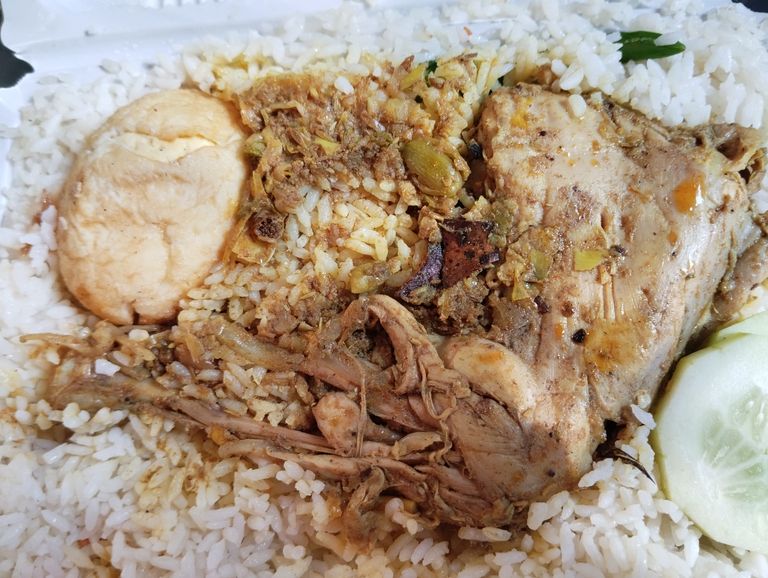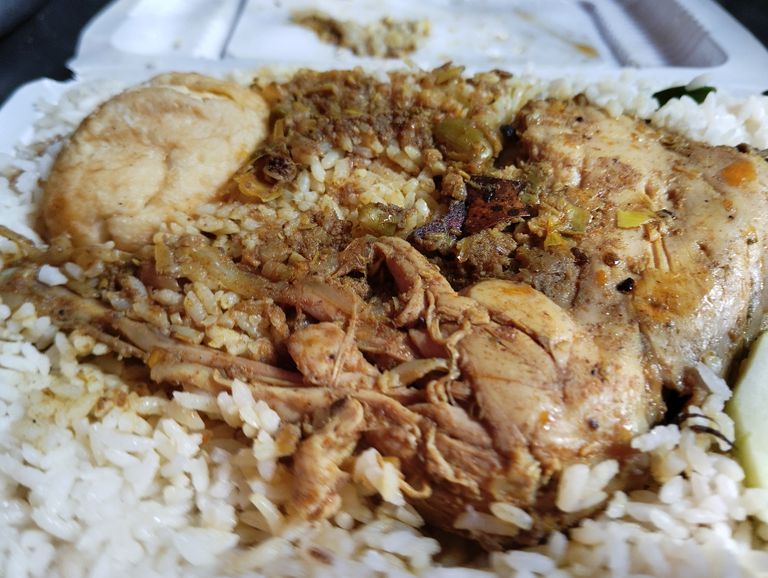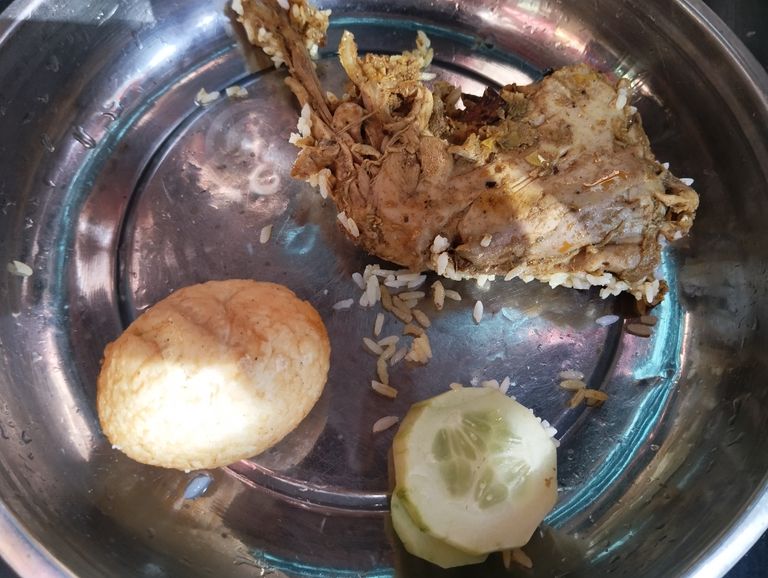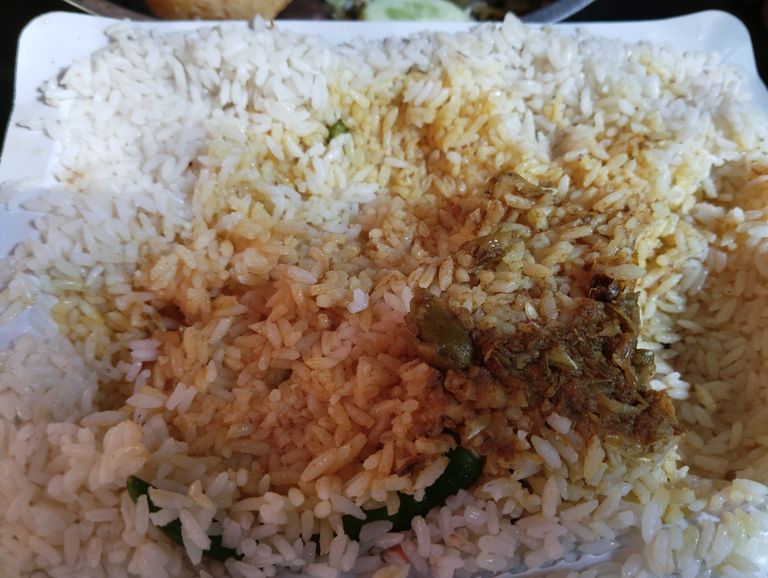
Golden Chicken Roast Recipe.
If you’re looking for a mouthwatering chicken dish that combines a rich golden hue with irresistible flavors, then the Golden Chicken Roast is the perfect recipe for you. This dish is ideal for festive occasions, family gatherings, or simply when you want to treat yourself to something special. Here's a step-by-step guide to making this flavorful delight.
Ingredients
To prepare this delicious dish, you’ll need the following ingredients:
For the Chicken
1 whole chicken (approximately 1.5–2 kg)
2 tablespoons lemon juice
1 tablespoon turmeric powder
Salt to taste
For the Marinade
1 cup plain yogurt
2 tablespoons ginger-garlic paste
2 teaspoons red chili powder (adjust to taste)
1 teaspoon turmeric powder
1 tablespoon roasted cumin powder
1 teaspoon coriander powder
1 teaspoon garam masala powder
1 teaspoon black pepper powder
2 tablespoons mustard oil or any cooking oil
For the Roast
3 tablespoons ghee (clarified butter)
2 medium onions, finely sliced
2-3 green chilies, slit
1 cinnamon stick
3-4 cardamom pods
3-4 cloves
2 bay leaves
1 cup chicken stock or water
Fresh coriander leaves, chopped (for garnish)
Preparation
Step 1: Clean and Prep the Chicken
- Clean the chicken thoroughly and pat it dry with a paper towel.
- Rub the chicken with lemon juice, turmeric powder, and salt. Let it rest for 15–20 minutes to remove any raw smell.
Step 2: Prepare the Marinade
- In a mixing bowl, combine all the marinade ingredients and mix well.
- Coat the chicken evenly with the marinade, ensuring it covers the entire surface, including inside the cavity.
- Cover the bowl with cling wrap and let the chicken marinate for at least 4–6 hours or overnight in the refrigerator for the best flavor.
Cooking the Golden Chicken Roast
Step 1: Sear the Chicken
- Heat 2 tablespoons of ghee in a large pan or Dutch oven over medium heat.
- Add the marinated chicken and sear it on all sides until golden brown. This step helps lock in the juices. Once done, set the chicken aside.
Step 2: Prepare the Masala Base
- In the same pan, add another tablespoon of ghee.
- Toss in the cinnamon stick, cardamom pods, cloves, and bay leaves. Sauté until aromatic.
- Add the sliced onions and cook until they turn golden brown.
- Add the slit green chilies and stir for a minute.
Step 3: Roast the Chicken
- Return the seared chicken to the pan.
- Pour in the chicken stock or water, ensuring the chicken is partially submerged.
- Cover the pan with a lid and let it cook on low heat for 30–40 minutes, occasionally basting the chicken with the pan juices.
- Flip the chicken midway to ensure even cooking.
Finishing Touches
- Once the chicken is tender and the gravy has thickened, turn off the heat.
- Transfer the chicken to a serving dish and pour the rich gravy over it.
- Garnish with chopped coriander leaves.
Serving Suggestions
Golden Chicken Roast pairs beautifully with:
Plain steamed rice
Fragrant pulao or biryani
Soft naan or paratha
For an added touch of elegance, serve it with a side of fresh salad or raita.
Pro Tips for the Perfect Roast
Marinate the chicken overnight for deeper flavors.
Use a heavy-bottomed pan for even heat distribution.
Adjust the spice levels based on your preference.
Golden Chicken Roast is a feast for the eyes and the palate. Its vibrant color, aromatic spices, and succulent meat make it a showstopper on any dining table. Try this recipe today and watch your loved ones savor every bite.

Rearing Golden Chickens: A Comprehensive Guide
Golden chickens, known for their unique golden feathers and excellent egg-laying capacity, have become a popular choice among poultry farmers. They are hardy, productive, and suitable for both small-scale backyard farming and commercial setups. If you’re planning to rear golden chickens, this guide will provide you with all the essential details to get started and maintain a thriving flock.
Why Choose Golden Chickens?
Golden chickens are favored for several reasons:
- High Egg Production: They are reliable layers, producing around 250–300 eggs annually.
- Resilient Nature: These birds adapt well to various climates and resist many common poultry diseases.
- Dual Purpose: Apart from eggs, they provide good-quality meat, making them ideal for both egg and meat production.
- Aesthetic Appeal: Their shiny golden feathers add a touch of beauty to any farm.
Setting Up for Golden Chickens
- Housing Requirements
Golden chickens need a clean, spacious, and secure environment to thrive.
Space: Provide at least 2-3 square feet per bird inside the coop and 8-10 square feet per bird for outdoor roaming.
Ventilation: Ensure proper airflow to prevent respiratory issues.
Lighting: Natural or artificial light is crucial for maintaining egg production, especially during shorter days. Aim for 12-16 hours of light daily.
Bedding: Use dry, absorbent materials like straw, sawdust, or wood shavings to keep the coop clean. Replace bedding regularly.
Safety: Protect the coop from predators like foxes, cats, or snakes using sturdy materials and secure fencing.
- Feeding and Nutrition
Proper nutrition is critical for their health and productivity.
Starter Feed: For chicks (0-6 weeks), use high-protein starter feed (20-22% protein).
Grower Feed: From 6-20 weeks, provide grower feed with 16-18% protein.
Layer Feed: Once they start laying (around 20 weeks), switch to layer feed containing 16% protein and calcium for strong eggshells.
Supplements: Add grit and oyster shells for digestion and calcium intake.
Hydration: Ensure a constant supply of clean water to prevent dehydration.
- Health Management
Golden chickens are hardy but require regular care to stay healthy.
Vaccination: Administer vaccines against common diseases like Newcastle Disease and Marek's Disease.
Deworming: Perform deworming every 3-6 months to control internal parasites.
Pest Control: Regularly check for mites, lice, and other external parasites. Use appropriate powders or sprays as needed.
Observation: Monitor for signs of illness, such as lethargy, reduced appetite, or abnormal droppings, and consult a veterinarian if necessary.
Breeding Golden Chickens
For farmers interested in breeding golden chickens:
- Selecting Breeders: Choose healthy, robust birds with desirable traits for breeding.
- Mating Ratio: Maintain a ratio of one rooster to 8-10 hens to ensure optimal fertilization.
- Incubation: Collect fertilized eggs and incubate them at 99.5°F (37.5°C) with 50-55% humidity for 21 days.
Challenges in Rearing Golden Chickens
Despite their resilience, golden chickens face some challenges:
- Predators: Ensure a secure coop to protect them.
- Disease Outbreaks: Maintain biosecurity measures, such as limiting farm visitors and disinfecting equipment.
- Extreme Weather: Provide shade and water during heatwaves and insulation during winters.
Benefits of Rearing Golden Chickens
- Sustainable Income: Regular egg production ensures consistent revenue.
- Low Maintenance: Compared to other poultry breeds, they are relatively low-maintenance.
- Market Demand: Their eggs and meat are highly sought after due to their quality and nutritional value.
Rearing golden chickens can be a rewarding venture if done correctly. With proper housing, nutrition, and health management, these birds can thrive and provide a steady source of income. Whether you’re a small-scale farmer or planning a commercial setup, golden chickens are a valuable addition to any poultry farm.

How Long Does It Take for Desi Chickens to Lay Eggs?
Desi chickens, also known as indigenous or native chickens, are a common sight in rural areas due to their ability to adapt to the local climate, resist diseases, and thrive on natural feed. These chickens are not only cherished for their flavorful meat but also for the high nutritional value of their eggs. If you're planning to raise desi chickens or are curious about their egg-laying habits, this article will explore how long it takes for desi hens to start laying eggs, along with other related insights.
When Do Desi Chickens Start Laying Eggs?
The time it takes for a desi chicken to start laying eggs largely depends on several factors, including breed, nutrition, and environmental conditions. On average:
Age of Egg-Laying: Desi chickens usually begin laying eggs at around 20 to 24 weeks of age. However, this can vary slightly based on their health and care.
Smaller Breeds: Some smaller native breeds may start laying eggs as early as 18 weeks.
Seasonal Influence: If the hen matures during the colder months or in less favorable conditions, the onset of egg-laying might be delayed.
Factors Influencing Egg-Laying in Desi Chickens
Several factors play a role in determining when a desi hen will begin laying eggs and how consistently it will lay them:
- Breed Characteristics
Desi chickens are known for being less prolific egg layers compared to commercial breeds like Leghorns. They generally lay between 60 to 100 eggs per year, whereas commercial breeds can produce over 300 eggs annually.
- Nutrition
A balanced diet rich in proteins, calcium, and essential minerals is crucial for the early and consistent laying of eggs. Desi chickens often forage for food, consuming grains, insects, and greens. Supplementing their diet with homemade feed or commercial layer feed can accelerate egg production.
- Lighting Conditions
The reproductive cycle of hens is influenced by daylight. Typically, hens require 12-16 hours of light per day to maintain consistent egg production. In rural areas, natural sunlight plays a key role in determining their laying patterns.
- Housing and Environment
Comfortable living conditions, clean water, and protection from predators and extreme weather are essential for the health and productivity of desi chickens. Stress-free environments lead to healthier hens and better egg production.
- Health and Disease Management
Desi chickens are hardy and naturally resistant to many diseases. However, proper vaccination, regular deworming, and disease prevention measures are essential to keep them in optimal health.
Egg-Laying Patterns of Desi Chickens
Desi chickens tend to lay fewer eggs compared to hybrid breeds, but the eggs are prized for their rich flavor and nutritional value. Here’s what to expect:
Frequency: Desi chickens generally lay an egg every 2-3 days under optimal conditions.
Seasonal Impact: They may stop laying eggs during the molting season or in extreme weather conditions.
Brooding Tendency: Many desi hens exhibit strong brooding instincts. This means they often stop laying eggs when they begin to incubate their eggs.
How to Encourage Egg Production in Desi Chickens
If you want your desi hens to start laying eggs earlier and produce more consistently, follow these tips:
- Provide a Balanced Diet: Include grains, protein sources like fish meal or soybean meal, and calcium supplements for strong eggshells.
- Ensure Fresh Water: Access to clean and fresh water is vital for overall health.
- Maintain Proper Shelter: Build a safe coop with proper ventilation and ample nesting boxes.
- Control Lighting: If natural light is insufficient, use artificial lighting to ensure hens get 12-16 hours of light.
- Monitor Health Regularly: Vaccinate your chickens and keep an eye on their behavior for signs of illness.
Common Challenges with Desi Chickens
Raising desi chickens comes with unique challenges:
Predator Threats: In rural areas, predators like snakes, dogs, and wild animals can pose a risk to chickens and their eggs.
Limited Egg Yield: Unlike commercial breeds, desi chickens have a lower egg production rate.
Broodiness: While brooding is beneficial for natural hatching, it interrupts egg production.
Despite these challenges, desi chickens are incredibly rewarding to raise due to their resilience and the superior quality of their eggs and meat.
Desi chickens typically start laying eggs between 20 and 24 weeks of age. Their egg-laying frequency and consistency depend on factors such as breed, nutrition, environment, and overall care. While they may not match commercial breeds in terms of egg production, their hardiness and the quality of their eggs make them a favorite among small-scale farmers and rural households. By providing proper care and attention, you can ensure that your desi chickens thrive and contribute to your family’s food supply in a sustainable way.


How Long Does It Take for Desi Chickens to Lay Eggs?
Desi chickens, also known as indigenous or native chickens, are a common sight in rural areas due to their ability to adapt to the local climate, resist diseases, and thrive on natural feed. These chickens are not only cherished for their flavorful meat but also for the high nutritional value of their eggs. If you're planning to raise desi chickens or are curious about their egg-laying habits, this article will explore how long it takes for desi hens to start laying eggs, along with other related insights.
When Do Desi Chickens Start Laying Eggs?
The time it takes for a desi chicken to start laying eggs largely depends on several factors, including breed, nutrition, and environmental conditions. On average:
Age of Egg-Laying: Desi chickens usually begin laying eggs at around 20 to 24 weeks of age. However, this can vary slightly based on their health and care.
Smaller Breeds: Some smaller native breeds may start laying eggs as early as 18 weeks.
Seasonal Influence: If the hen matures during the colder months or in less favorable conditions, the onset of egg-laying might be delayed.
Factors Influencing Egg-Laying in Desi Chickens
Several factors play a role in determining when a desi hen will begin laying eggs and how consistently it will lay them:
- Breed Characteristics
Desi chickens are known for being less prolific egg layers compared to commercial breeds like Leghorns. They generally lay between 60 to 100 eggs per year, whereas commercial breeds can produce over 300 eggs annually.
- Nutrition
A balanced diet rich in proteins, calcium, and essential minerals is crucial for the early and consistent laying of eggs. Desi chickens often forage for food, consuming grains, insects, and greens. Supplementing their diet with homemade feed or commercial layer feed can accelerate egg production.
- Lighting Conditions
The reproductive cycle of hens is influenced by daylight. Typically, hens require 12-16 hours of light per day to maintain consistent egg production. In rural areas, natural sunlight plays a key role in determining their laying patterns.
- Housing and Environment
Comfortable living conditions, clean water, and protection from predators and extreme weather are essential for the health and productivity of desi chickens. Stress-free environments lead to healthier hens and better egg production.
- Health and Disease Management
Desi chickens are hardy and naturally resistant to many diseases. However, proper vaccination, regular deworming, and disease prevention measures are essential to keep them in optimal health.
Egg-Laying Patterns of Desi Chickens
Desi chickens tend to lay fewer eggs compared to hybrid breeds, but the eggs are prized for their rich flavor and nutritional value. Here’s what to expect:
Frequency: Desi chickens generally lay an egg every 2-3 days under optimal conditions.
Seasonal Impact: They may stop laying eggs during the molting season or in extreme weather conditions.
Brooding Tendency: Many desi hens exhibit strong brooding instincts. This means they often stop laying eggs when they begin to incubate their eggs.
How to Encourage Egg Production in Desi Chickens
If you want your desi hens to start laying eggs earlier and produce more consistently, follow these tips:
- Provide a Balanced Diet: Include grains, protein sources like fish meal or soybean meal, and calcium supplements for strong eggshells.
- Ensure Fresh Water: Access to clean and fresh water is vital for overall health.
- Maintain Proper Shelter: Build a safe coop with proper ventilation and ample nesting boxes.
- Control Lighting: If natural light is insufficient, use artificial lighting to ensure hens get 12-16 hours of light.
- Monitor Health Regularly: Vaccinate your chickens and keep an eye on their behavior for signs of illness.
Common Challenges with Desi Chickens
Raising desi chickens comes with unique challenges:
Predator Threats: In rural areas, predators like snakes, dogs, and wild animals can pose a risk to chickens and their eggs.
Limited Egg Yield: Unlike commercial breeds, desi chickens have a lower egg production rate.
Broodiness: While brooding is beneficial for natural hatching, it interrupts egg production.
Despite these challenges, desi chickens are incredibly rewarding to raise due to their resilience and the superior quality of their eggs and meat.
Desi chickens typically start laying eggs between 20 and 24 weeks of age. Their egg-laying frequency and consistency depend on factors such as breed, nutrition, environment, and overall care. While they may not match commercial breeds in terms of egg production, their hardiness and the quality of their eggs make them a favorite among small-scale farmers and rural households. By providing proper care and attention, you can ensure that your desi chickens thrive and contribute to your family’s food supply in a sustainable way.